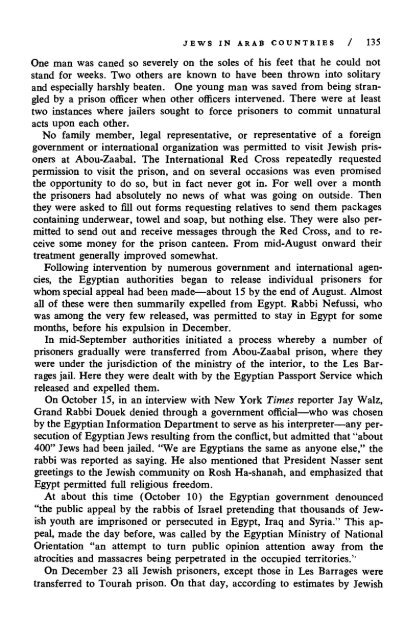1968_4_arabisraelwar
Create successful ePaper yourself
Turn your PDF publications into a flip-book with our unique Google optimized e-Paper software.
JEWS IN ARAB COUNTRIES / 135<br />
One man was caned so severely on the soles of his feet that he could not<br />
stand for weeks. Two others are known to have been thrown into solitary<br />
and especially harshly beaten. One young man was saved from being strangled<br />
by a prison officer when other officers intervened. There were at least<br />
two instances where jailers sought to force prisoners to commit unnatural<br />
acts upon each other.<br />
No family member, legal representative, or representative of a foreign<br />
government or international organization was permitted to visit Jewish prisoners<br />
at Abou-Zaabal. The International Red Cross repeatedly requested<br />
permission to visit the prison, and on several occasions was even promised<br />
the opportunity to do so, but in fact never got in. For well over a month<br />
the prisoners had absolutely no news of what was going on outside. Then<br />
they were asked to fill out forms requesting relatives to send them packages<br />
containing underwear, towel and soap, but nothing else. They were also permitted<br />
to send out and receive messages through the Red Cross, and to receive<br />
some money for the prison canteen. From mid-August onward their<br />
treatment generally improved somewhat.<br />
Following intervention by numerous government and international agencies,<br />
the Egyptian authorities began to release individual prisoners for<br />
whom special appeal had been made—about 15 by the end of August. Almost<br />
all of these were then summarily expelled from Egypt. Rabbi Nefussi, who<br />
was among the very few released, was permitted to stay in Egypt for some<br />
months, before his expulsion in December.<br />
In mid-September authorities initiated a process whereby a number of<br />
prisoners gradually were transferred from Abou-Zaabal prison, where they<br />
were under the jurisdiction of the ministry of the interior, to the Les Barrages<br />
jail. Here they were dealt with by the Egyptian Passport Service which<br />
released and expelled them.<br />
On October 15, in an interview with New York Times reporter Jay Walz,<br />
Grand Rabbi Douek denied through a government official—who was chosen<br />
by the Egyptian Information Department to serve as his interpreter—any persecution<br />
of Egyptian Jews resulting from the conflict, but admitted that "about<br />
400" Jews had been jailed. "We are Egyptians the same as anyone else," the<br />
rabbi was reported as saying. He also mentioned that President Nasser sent<br />
greetings to the Jewish community on Rosh Ha-shanah, and emphasized that<br />
Egypt permitted full religious freedom.<br />
At about this time (October 10) the Egyptian government denounced<br />
"the public appeal by the rabbis of Israel pretending that thousands of Jewish<br />
youth are imprisoned or persecuted in Egypt, Iraq and Syria." This appeal,<br />
made the day before, was called by the Egyptian Ministry of National<br />
Orientation "an attempt to turn public opinion attention away from the<br />
atrocities and massacres being perpetrated in the occupied territories. 1 '<br />
On December 23 all Jewish prisoners, except those in Les Barrages were<br />
transferred to Tourah prison. On that day, according to estimates by Jewish


